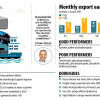How to navigate a recession

A recession is a substantial decline in overall economic activity, lasting more than a few months, typically visible in real gross domestic product, actual income, employment, industrial production, and wholesale-retail sales.
In maximum recessions, economic productivity and employment decline simultaneously. Ultimately, higher unemployment leads to lower consumer spending and that creates a vicious cycle.
Since Bangladesh's economy is currently in the graduation stage, a recession will have a significant adverse impact on economic growth. The economy will receive a blow if we are not serious in the precaution stage.
Recessions are bad news for small businesses. For small businesses with little cash reserves, the general economic belt-tightening and expense mounting can make it harder for sales growth, procurement at fair prices, and the overall cash flow system of any enterprise.
However, it might not be all bad news, though with the right preparation in place. We may come out better than most if we act properly with adequate groundwork during and before a recession.
To start with, we have to remember when a recession hits, clients take a little longer to pay up, and we have to be aware of the probability that some may not be able to pay at all.
Cash flow is the biggest issue concerning small businesses. Without handsome cash reserves to fall back on, we can get stuck relying on clients' prompt payments. Monitoring and follow-up for collection need special focus.
When people are tightening their purse strings, we need to tighten our business belts as well. Cutting on unnecessary spending and renegotiating vendor agreements with more favourable terms might be the area of application during a recession.
During a recession, it is important to do whatever we can to stay top-of-mind for customers. Despite the financial hardships we may be experiencing, be sure to budget funds for marketing with a cost to create a strong online presence and do our best to stay in front of your customer's minds.
Happy customers increase business. Repeat and referral business is exceedingly important in a recession. Ensuring that our end-users are happy is vital in any economy, especially in a recession. When money gets tight, everyone looks for ways to cut expenses.
In a stable business, we allow our employees to pursue various types of activities--some profitable, some may not. Getting into a recession is the best time to perform an audit of our employees' activities and get a very clear understanding of what is profitable.
This might not be a good time when we should be investing heavily in completely new business ventures. Rather, it is worth testing out some creative ideas with our existing products and offerings. During tough times, we probably won't be thriving unless we are really lucky. More than anything we should be in maintenance mode.
Traditionally, we should focus on debt repayments ahead of a recession. In some ways, it makes sense to get that major burden out of the way. Sometimes it's smarter to continue making minimum payments on existing debts during recessions.
Recessions can be scary for a small business owner but oftentimes they can help us find places to optimise our business. When we go through a hostile situation, we are able to build confidence in our abilities. Buckle down and focus on what we can control. The right moves will set you up for success in the coming days.
The writer is a banker

 For all latest news, follow The Daily Star's Google News channel.
For all latest news, follow The Daily Star's Google News channel. 








Comments